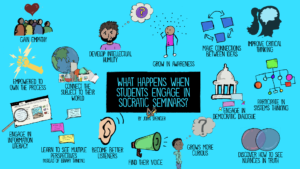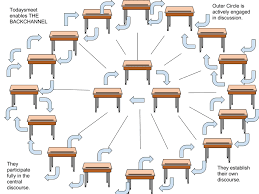I was asked to research, design, run and record an ‘open’ workshop to teach an aspect of my practice to a group of peers. I’m not sure what an ‘exercise’ is, or if I even have one! How can I figure this out? I’m also not sure what ‘teaching’ in ‘open’ might involve. If I have an exercise, how do I support others to learn it in an open way?
I think that the discussion of artistic values and critical thinking is an essential part of the development of contemporary art, and that the public today may not lack a definition of the ‘external beauty’ of a work of art, but I think that the knowledge of the values and cultural context behind a work of art is very much lacking, so I think my “I would like it to be more like a seminar, where a text, a story or a work of art is used to lead the participants to discuss and create different inspirations and values.
So how do I figure out this ‘open’ workshop? In my quest to practice critical thinking methods, I found a particularly interesting approach – the Socratic Seminar. This workshop was initially used for differentiated teaching in schools, but I thought it was a particularly good way to draw on it to support my ‘exercise’, and it worked well both online and offline.

For example.
1. choosing a text: we can use as a source text a deeply valuable work of art, a controversial art theory or a literary work with an open ending.
2.Prepare participants: While participants should read carefully and be prepared for each session, it is usually best to tell students in advance when they will be participating in a Socratic seminar (we can post this part in advance through our website or social media platforms). As the workshop requires participants to continue to focus on the text, we can distribute post-it notes for students to use to annotate the text as they read.
3. Prepare questions: While participants may ultimately be responsible for moderating the entire session, the facilitator usually takes on the role of discussion leader when participants workshop and ask questions. Ask as many open-ended questions as possible, targeting those whose value lies in exploration rather than answers.

4.Establishing participant expectations: Because participant inquiry and reflection are central to the philosophy of the Socratic Seminar, the inclusion of participants as a whole in the establishment of seminar norms is a real initiative. Begin by asking participants to distinguish between behaviours that characterise debate (persuasion, prepared rebuttals, clear positions) and behaviours that characterise discussion (enquiry, responses that emerge from the ideas of others, community spirit). Hold participants accountable for the norms they agree to. I believe that in an open educational process this is a must for every participant, so the facilitator can guide as appropriate.
5.Establish the role of the facilitator: While the facilitator can take the lead by identifying which open-ended questions students will explore (at the outset), the facilitator should not see himself or herself as a key participant in the pursuit of these questions. You may find it useful to limit your distractions to useful reminders about the process (e.g., “Maybe this is a good time to shift attention back to the text?” “Are we ready to explore different aspects of the text?”) . Resist the urge to correct or redirect, relying instead on other participants to respectfully challenge peer interpretations or offer different perspectives.

6.Assessing effectiveness: Socratic workshops require assessments that respect the central nature of participant-centred inquiry to success. The most comprehensive measure of success is reflection by facilitators and participants on the extent to which text-centred participant talk dominates class time and work. Reflective writing that asks participants to describe their participation and set their own goals for future workshops is also effective. It is important to understand that, like the workshop itself, the process of acquiring the ability to explore the text at any given point is more important than ‘getting it right’. Of course the resulting text could be posted later in the online creative community, which would be a very meaningful continuation of the original text.
So I think that the focus of OER ‘exercises’ is not on teaching, and that art sites like Education or Art for All are already saturated, and that the bottleneck of OER today is, I think, how to get participants to discuss and thus generate new and interesting knowledge and values that will be more attractive than mere education.

Comments
By reflecting on the development of contemporary art, the blogger suggests that there is a lack of appreciation for the values and cultural contexts expressed in artworks. But if the format is a workshop, how is it different from traditional art education? The author clearly lays out the steps on how to conduct a workshop and it is clear that the author has read a lot of material and articles. But what is the specific ‘practice’ of the workshop?
The blogger’s introduction to the Socratic Seminar was very enlightening, with very detailed information on how to get participants involved in the discussion, how to prepare questions and assess effectiveness, etc. However, unlike the blogger’s view, I believe that the essence of open education should still be back to education, and that discussion and participation should be an aid.